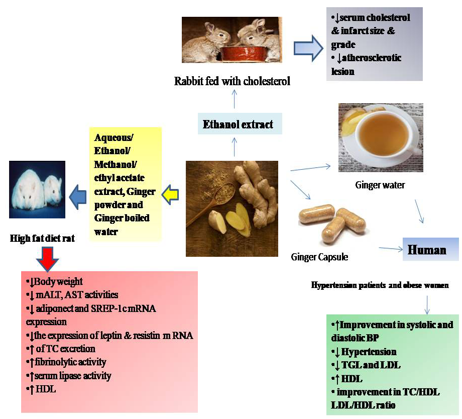Introduction
Herbs and plants are used as a source of therapeutic compounds in traditional medicinal system since ancient time. Medicinal plants play an important role in ethno medicine and pharmaceutical markets.1 The rhizome of ginger has been used as a spice & traditional medicine.2 Ginger is an herbaceous perennial plant with thick tuberous rhizome. Plant can grow up to 30 to 100 cm (1-3 ft) tall. Leaves are lance-shaped, bright green colored covered by sheathing base.3 Rhizomes are pale yellow, thick, aromatic and grow underground. Flowering spikes sprout directly from the rhizome. Cultivated in both tropical and subtropical countries like India, China, Bangladesh, Taiwan, Jamaica, Nigeria. Ginger has got medicinal value from the abundant chemical constituents present in them.4 Chemical analysis of ginger showed above 400 different compounds, among them are carbohydrates (50-70%), lipids (3-8%), terpenes & phenolic compounds are major constituents.5 Gingerols, shogaols, paradols are major phenolic compounds whereas quercetin, zinger one, gingerenone-A, and dehydro gingerdione are some of the other phenolic compounds.6, 7, 8 α-curcumin, β-bisabolene, zingiberene, α-farnesene, and β-sesquiphellandrene are several terpene compounds.9 The plant is reported for analgesic activity, anticancer, anti-diabetic activity, antiemetic, antimicrobial, anti-inflammatory activity, antioxidant activity and neuroprotective activity.10 The present review is focused on cardio protective effect of zingiber officinale.
Vernacular names of ginger11
Table 0
CVD
Cardiovascular diseases have been considered to be a leading cause of premature death and in 2008 17.3 million people died from CVD. Age, diabetes, dietary factors, dyslipidemia, hypertension, lack of physical activity, obesity, sedentary life style, sex and Smoking are risk factors responsible for premature deaths due to CVD.12 A series of studies has shown that bioactive components of ginger namely gingerol and shogaol give protection against cardiovascular diseases.13
Hypotensive effect
Hypertension is the condition in which blood pressure is equal or more than 140/139 mm Hg. Hypertension can be managed by antihypertensive medications, modifying life style and through alternative herbal therapy such as ginger.14 Study of Ghayur and Gilani, 2005 reported that the crude extract of ginger (0.3-3 mg/kg) alleviated arterial blood pressure in anesthetized rats. In guinea pig paired atria crude extract of ginger exhibited cardio-depressant activity on the rate and force of spontaneous contraction.15 Study of Sathyanand et al., 2013 on hypertensive patients stated that ginger was effective in relieving high blood pressure by blocking calcium channels of organ and arterial walls, which induce smooth muscle contraction.16 Study of Shaban et al., 2017 on hypertensive patients reduced systolic and diastolic blood pressure in two study groups who took ginger while control group (took only anti-hypertensive drugs) had the signs and symptoms of hypertension in both pre and post study.14 Study conducted on obese women improved TC/HDL and LDL/HDL ratios and decreased triglycerides on administration of ginger capsules.17
Table 1
Study design and demographic description of cardio protective effect of Z. officinale with high quality evidence
Table 0
Prevention of obesity
Imbalance between energy intake and expenditure leads to excessive energy storage as triglycerides in adipose tissue known as obesity; it can cause many serious health problems.18 Ginger has shown the most significant anti-obesity effects in in-vitro and in-vivo studies. Administration of aqueous extract of ginger to high fat fed rats decreased triglyceride and low-density lipoprotein and increased high density lipoprotein.19 Study conducted by Sayed et al. reported that rat received ginger water decreased body weight, mRNA expression of sterol regulatory element-bonding protein 1 (SREBP-1c) in liver and adipose tissues were down regulated, while those of adiponectin, hepatic carnitine palmitoyltransferase1 (CPT-1), acetyl-coA-oxidase (ACO), Glucose transporter 2 (GLUT-2), and pyruvate kinase (PK) were upregulated.20 Furthermore, ginger decreased elevated serum lipase activity, high density lipoprotein & increased total cholesterol excretion in rats.21 Ginger capsules improved TC/HDL and LDL/HDL ratios and attenuated triglyceride and low-density lipoprotein in the study conducted on obese women.17
Prevention of atherosclerosis
Atherosclerosis is build-up of low-density lipoprotein, cholesterol on the inner wall of an artery and vascular inflammation leading to interruption of blood flow.22, 23 The effect of dry ginger powder (0.1g/kg body weight) was studied on experimentally induced atherosclerosis in rabbit for 75 days. This significantly decreased serum cholesterol, atherosclerotic lesion, infarct size and grade.24 Verma et al., 2004 conducted study on Indian albino rabbits’ administration of ginger powder (0.1 g/kg body weight) for 75 day decreased lipid peroxidation and enhanced fibrinolytic activity. These distinct properties prevent development of atherosclerosis.25, 26, 27, 28, 29, 30, 31, 32, 33, 34, 35, 36
Conclusion
Ginger is used as a spice, flavoring agent, food and medicines. Pharmacological screenings of Zingiber officinale revealed its curative properties. The present review is based on current and past research done on the cardioprotective effect of ginger. Ginger was found helpful in management and restoration of hypertension, obesity, atherosclerosis and hypolipidemia.

